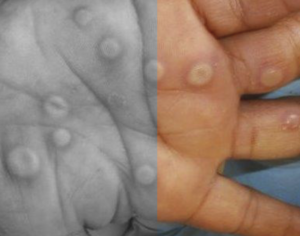Lack of tecovirimat activity against mpox clade 1
21 October 2024. Related: mpox, Coinfections and complications.
Simon Collins, HIV i-Base
 Several months ago a press release from the US NIH reported no benefit from the use of tecovirimat to treat mpox clade 1 in the Palm007 study in the Democratic Republic of the Congo (DRC). The statement from Siga Technologies suggested possible sub-group differences. [1]
Several months ago a press release from the US NIH reported no benefit from the use of tecovirimat to treat mpox clade 1 in the Palm007 study in the Democratic Republic of the Congo (DRC). The statement from Siga Technologies suggested possible sub-group differences. [1]
The PALM007 study randomised (1:1) 597 participants hospitalised for two weeks at two sites in DRC to either tecovirimat or placebo.
Further details from this study were presented at the IDWeek 2024 conference in October. [2, 3]
However, as this meeting does not post open access to presentations, the limited additional results are based on a report from MedPage Today.
Results included:
- A non-significant difference in lesion resolution in hospitalised people: 7 vs 8 days (competing-risks HR 1.13, 95% CI 0.97-1.31, P=0.14).
- Mortality was high at 1.7% in both groups by day 58.
- There were also no differences in PCR viral changes in any body site.
- Tecovirimat dosing varied according to patient weight.
- Mean age was 16 years and over 64% were younger than age 18.
- Lesion count was extremely high at 500 per person in each group.
- About 20% were coinfected with malaria but very few (0.7%) were infected with HIV.
A second talk at IDWeek emphasised the lack of current treatment options for mpox. [4]
Siga Technologies also just announced an agreement with Vanderbilt University to have access to a portfolio of preclinical human monoclonal antibodies (mAbs), which could potentially be used against smallpox and mpox. [5]
comment
There is an urgent need for greater transparency over these results which have still not been made widely available. Early results from other ongoing studies should also perhaps be released early if they are no longer effectively enrolling.
The two early press statements included little detail and included conflicting interpretations of the results. The presentation at IDWeek is behind a paywall, with no response yet from the lead investigator to share these slides.
With such limited options, tecovirimat is still likely to be used when access is available. The Palm007 study perhaps shows lack of efficacy when used late and in severe advanced infections as these participants had a median of almost 500 lesions.
Small studies and case reports that include tecovirimat, continue to report potential benefits but could be confounded by many other factors. [6]
References
- WHO declares new mpox emergency (clade 1b): tecovirimat not effective in DRC study. HTB (16 August 2024).
https://i-base.info/htb/48410 - Tshiani O et al. Tecovirimat for the treatment of mpox: a randomized placebo-controlled trial in the Democratic Republic of Congo (PALM007). IDWeek 2024.
https://idweek.org/ - Wilkin T. Alternative antiviral therapies for treating severe mpox infection. IDWeek 2024.
https://idweek.org/ - Kahn K. Tpoxx no better than placebo for clade 1 mpox — “We have no current effective therapies,” for mpox, expert warns. (18 October 2024).
https://www.medpagetoday.com/meetingcoverage/idweek/112469 - SIGA Technologies press release. SIGA enters into exclusive license agreement with Vanderbilt University for novel poxvirus monoclonal antibodies. (22 October 2024).
https://investor.siga.com/investors/news/news-details/2024/SIGA-Enters-into-Exclusive-License-Agreement-with-Vanderbilt-University-for-Novel-Poxvirus-Monoclonal-Antibodies/default.aspx - HTB. Mpox breakthrough cases after two doses of the MVA-BN vaccine. HTB (29 October 2024).
https://i-base.info/htb/49243

